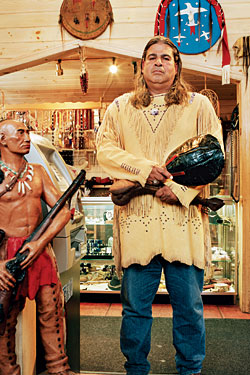 "When Thomas Jefferson visited the “Unquachog Indians,” in June 1791, he noted that the tribe “constitute the Pufspatock Settlement in the town of Brookhaven, South Side of Long Island.” The settlement was conveniently located in the backyard of his friend William Floyd’s plantation, where Jefferson and his longtime wingman James Madison happened to be crashing. Jefferson made an effort to document the language of the tribe, many of whose members tilled his host’s fields: “Cow … Cowsen; Horse … Hofses; Sheep … Sheeps; to cut with an axe … poquetahaman; handsome … worecco; ugly … nechowuchayuk.” He concluded: “There remain but three persons of this tribe who can speak its language: They are old women, from two of these, brought together, this vocabulary was taken, a young woman of the same tribe was also present who knew something of the language.”
Harry Wallace, the current chief of the Unkechaug Indian Nation, trying to learn at least an approximation of his native tongue, has an Algonquian-language app on his iPhone. “I’m gettin’ there,” he said from behind a large cluttered desk in his office, a small cedar-paneled lodge set behind Poospatuck Smoke Shop and Trading Company in Mastic, Long Island. It was early August; 65 miles away on Manhattan Island, Mike Bloomberg—modern-day equivalent of the Great White Father—was not happy with Chief Wallace and the Unkechaug. This is because the chief and his tribe were making big bucks selling millions of packs of cigarettes tax-free, many of these to residents of New York City, which imposes a $1.50-per-pack tax of its own. Exactly how many New Yorkers were getting smokes under cover of the Unkechaug is not easy to answer. An Independent Budget Office report estimated that in 2006, around 207 million packs were bought by city smokers. No tax was paid on a quarter of these (only a fraction of the untaxed smokes were bought on Indian reservations). But Bloomberg has declared war on smoking, and wherever there is smoke, he wants his cut. So last September, the city filed a motion in federal court against a group of Unkechaug retailers, claiming hundreds of millions in lost city tax revenue.
Wallace was still recovering from last night’s “sweat”—several important dudes, dome-shaped lodge, a pit of hot rocks in the middle, much perspiration, a prayer song or two—at an undisclosed location. It was the culmination of a week of mourning for Benny Miller, a 22-year-old tribe member who died in a motorcycle accident. His death mobilized Unkechaug near and far to return to the reservation, to mourn and sing: the honor song during the wake, the various burial and prayer songs throughout."
Get the Story:
"When Thomas Jefferson visited the “Unquachog Indians,” in June 1791, he noted that the tribe “constitute the Pufspatock Settlement in the town of Brookhaven, South Side of Long Island.” The settlement was conveniently located in the backyard of his friend William Floyd’s plantation, where Jefferson and his longtime wingman James Madison happened to be crashing. Jefferson made an effort to document the language of the tribe, many of whose members tilled his host’s fields: “Cow … Cowsen; Horse … Hofses; Sheep … Sheeps; to cut with an axe … poquetahaman; handsome … worecco; ugly … nechowuchayuk.” He concluded: “There remain but three persons of this tribe who can speak its language: They are old women, from two of these, brought together, this vocabulary was taken, a young woman of the same tribe was also present who knew something of the language.”
Harry Wallace, the current chief of the Unkechaug Indian Nation, trying to learn at least an approximation of his native tongue, has an Algonquian-language app on his iPhone. “I’m gettin’ there,” he said from behind a large cluttered desk in his office, a small cedar-paneled lodge set behind Poospatuck Smoke Shop and Trading Company in Mastic, Long Island. It was early August; 65 miles away on Manhattan Island, Mike Bloomberg—modern-day equivalent of the Great White Father—was not happy with Chief Wallace and the Unkechaug. This is because the chief and his tribe were making big bucks selling millions of packs of cigarettes tax-free, many of these to residents of New York City, which imposes a $1.50-per-pack tax of its own. Exactly how many New Yorkers were getting smokes under cover of the Unkechaug is not easy to answer. An Independent Budget Office report estimated that in 2006, around 207 million packs were bought by city smokers. No tax was paid on a quarter of these (only a fraction of the untaxed smokes were bought on Indian reservations). But Bloomberg has declared war on smoking, and wherever there is smoke, he wants his cut. So last September, the city filed a motion in federal court against a group of Unkechaug retailers, claiming hundreds of millions in lost city tax revenue.
Wallace was still recovering from last night’s “sweat”—several important dudes, dome-shaped lodge, a pit of hot rocks in the middle, much perspiration, a prayer song or two—at an undisclosed location. It was the culmination of a week of mourning for Benny Miller, a 22-year-old tribe member who died in a motorcycle accident. His death mobilized Unkechaug near and far to return to the reservation, to mourn and sing: the honor song during the wake, the various burial and prayer songs throughout."
Get the Story:The Smoke-Shop Signals of the Unkechaug (New York Magazine 10/4) Related Stories:
Blog: Hearing set on New York tribal tobacco (10/2)
New York smokeshops face deadline for taxes (9/25)
Cigarettes seized from New York smoke shops (08/28)
Indian retailers ordered to stop tobacco sales (8/27)
Obama pick opposes New York tribal smoke shops (5/20)
Judge rejects bid to end New York tobacco lawsuit (3/17)
Editorial: Indian smokeshops and organized crime (10/27)
Editorial: New York City finds a new foe in tribes (10/10)
More than 30M cartons sold on New York reservations (10/2)
New York City mayor sues Indian smokeshops (9/30)